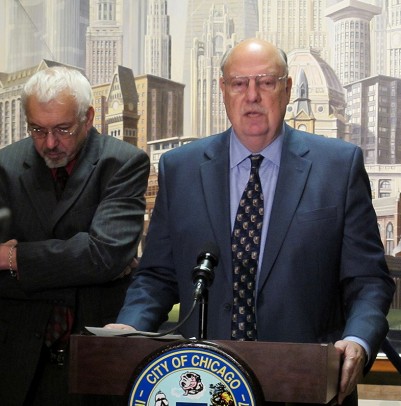Police corruption due to ‘blue code of silence’

John Hagedorn (left), professor of criminology, law and justice, and Dick Simpson, professor of political science, discuss their report on corruption among Chicago police officers at a press conference at City Hall. Photo: Thomas Gradel
Police corruption in Chicago survives due to a lack of oversight and indifference from internal and external leadership, according to a new report published by UIC researchers.
The report, “Crime, Corruption and Cover-ups in the Chicago Police Department,” examines the convictions of Chicago Police officers since 1960.
Over the past five decades, no fewer than 300 officers have been convicted of crimes such as drug dealing, beatings of civilians, destroying evidence, protecting mobsters, theft and murder. More than 90 of the convictions have taken place since 2000.
“By far, most officers are law-abiding, dedicated public servants,” says report co-author John Hagedorn, professor of criminology, law and justice.
“The real problem is that an embarrassingly large number of police officers violate citizens’ rights, engage in corruption and commit crimes while escaping detection and avoiding discipline or prosecution for many years.”
According to the report, police corruption is enabled by a “blue code of silence” entrenched in a department culture where officers avoid reporting crimes and misconduct by their colleagues.
Hagedorn says the war on drugs makes oversight of policing more difficult for patrol officers and drug and vice officers alike.
The report finds that standard drug-law enforcement operations can blur the line between corrupt and upstanding, thus reinforcing a need for tighter supervision and training of sergeants and front line supervisors.
To combat police corruption, the researchers propose a combination of external review initiatives and internal incentives. One key recommendation is to replace the appointed Police Board with a democratically elected board of civilians, or an entire new appointed board.
“These proposed reforms are designed to create effective oversight structures and a culture of honest service within the Chicago Police Department,” said report co-author Dick Simpson, professor of political science.
“Police corruption not only undermines public trust in law enforcement,” Simpson said, but costs taxpayers millions of dollars in corruption-related prosecutions, lawsuits, defense and settlements.
The report includes:
• detailed recommendations
• historical data and information on Chicago Police Department corruption and oversight
• categorization of police conviction statistics
• 10 case studies illustrating the different types of corruption.
